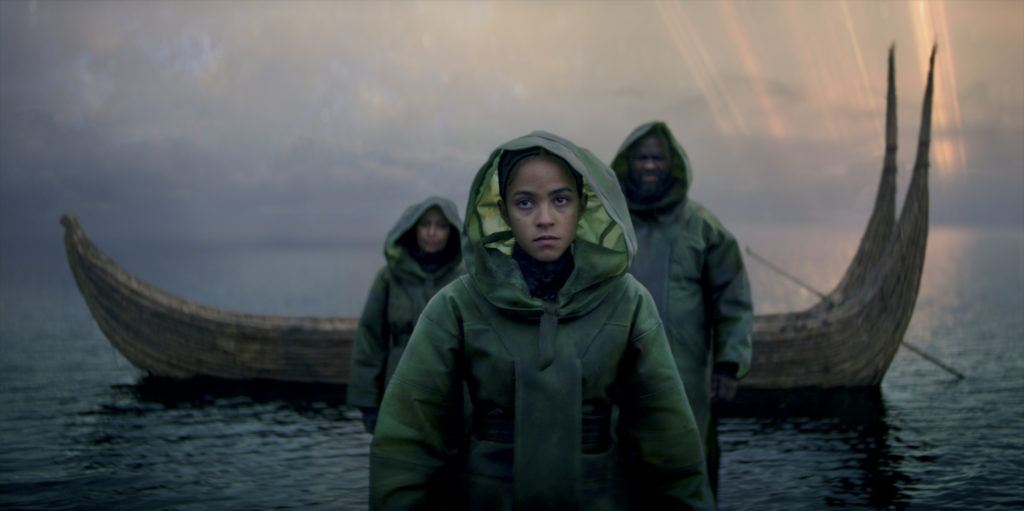Foundation

Image courtesy AppleTV+.
A trilogy first published in the 1950s, Isaac Asimov’s sprawling narrative spans millennia, follows tyrannical galactic dynasties, imagines opaque and cult-like religions, depicts advanced technology akin to magic, predicts the use of algorithms to foresee the the future, and examines the immutable truth of human nature. The AppleTV+ adaptation shares all of these defining characteristics.
David Goyer’s series should be evaluated on its own merits, and by the standard of its own intent. Outside of aesthetic considerations (e.g. sumptuous mosaics created by shifting nanopigments, vibrant aesthetics unique to individual planetary cultures, spacetime-warping ships that would qualify as Kardeshev Type 4 technology), the series’ first two episodes focus on themes that are both poignant and agonizingly familiar.
Mathematical savant Gaal Dornick (Lou Llobell) is from a family of algae farmers on a small, remote planet in the Galactic Empire. A stunning, endless ocean covers her home world—encircled by massive planetary rings visible in its clear blue sky. Yet amidst this stark beauty, the people impose a strict religious doctrine. Inquisitions purged all forms of science and mathematics. In direct violation of her society’s laws, Gaal, an autodidact, teaches herself the most esoteric theoretical frameworks by candle under the dark of night. She enters a mathematics contest initiated by Hari Seldon (Jared Harris), a Professor of Probability Theory at a university on the galactic capital planet, Trantor. Despite the competition’s vast talent pool, Gaal’s solution proves singularly correct. She leaves her parents and her provincial homeworld knowing that her life will never be the same.
Bright-eyed yet savvy, Gaal provides the audience with a complex surrogate as the story plunges us into the complex politics of Trantor. Upon her arrival, she and Seldon are almost immediately arrested, charged with High Treason and Conspiracy to Destabilize the Emperium. Seldon’s unimaginably complex predictive model known as Psychohistory has caught the attention of the Imperial Triad, a trinity of clones “decanted” at different stages in life—each cloned from Emperor Cleon I. Brother Day (Lee Pace), the clone in his middle-aged prime, recognizes the threat Seldon’s doctrine presents to their four century-long dynasty and gives Trantor’s citizens the entertainment of a public trial. He wants them to see their oracle and would-be savior exposed as a charlatan.
What could have come off as rote regurgitation of impossible-to-remember names and places is instead presented as a compelling tale of complex people with equally complex agendas. We’re sucked into this lovingly-built world governed by egos and politics comparable to the feints and counter-feints seen in HBO’s Game of Thrones in its formative seasons. Hari Seldon is a genius driven by the desire to save humankind, but he’s also a narcissist—a master at subtly manipulating those closest to him. Because of their similarities, Brother Day immediately recognizes Seldon for what he truly is; a formidable adversary who may actually pose a threat to his rule.
The tyranny of the Cleonic Dynasty manifests in the desperation of the oppressed, people who are quite literally marginalized on the rim of the galaxy, far from Trantor’s abundance. The ruling Triad favors the inner worlds, enriched by serendipitous location, while the outer planets languish, poached of their resources—living in scientific ignorance and poverty. It’s a tale as old as time, a cyclical pattern seen over and over again in our own past. Like the Roman Empire, the twelve thousand-year old Galactic Empire is spread far too thin across too much territory, trying (and failing) to exert control over its 8 trillion citizens. Red flags are visible everywhere; civilizational decline is inevitable. The only question: when, and how long the post-apocalyptic dark age will last.
Foundation holds a mirror up to America and asks us to consider the consequences of our own brand of imperialism. A coordinated attack orchestrated by extremist factions from two outer reach worlds results in an unfathomable loss of life, depicted unflinchingly and with viscerally familiar imagery. The Empire’s immediate and disproportionately punitive response is also agonizingly familiar. Weaponized Jump Ships surround the radical attackers’ home planets like drones preparing to strike. Foundation isn’t borrowing from our reality so much as it’s showing us how universal human behavior is, and how predictable we are in large groups under specific circumstances: fascist regimes and unsustainable greed can only last so long. White supremacy, generational wealth, and impenetrable dynasties persist—oft-repeated injustices in history’s long arc. Gatekept education allows ignorance and superstition to take hold, giving leaders tools to further oppress and control.
There’s a moment in the second episode that took my breath away. Seldon’s followers work to create an “Encyclopedia Galactica”, a compilation of humanity’s most valuable knowledge. In the event of cataclysm, civilization won’t be reset to zero; instead, there will be a foundation to build upon. The individuals, hand-picked by one man, argue over what to save, and what to condemn to the dustbin of history. Gaal astutely points out that they’re all counting with a base ten mathematical system because it’s common to their own homeworlds, meanwhile thousands of other systems within the galactic empire utilize base twelve and base twenty-seven numerical systems. That small group of Seldon’s chosen few have the power to preserve or annihilate entire cultures, a power also possessed by tyrants like Brother Day.
The people of this fantastical galactic empire struggle with achingly human decisions, and often make the selfish or easy choice. Not all of them are good, but even the evil ones aren’t all evil. Like the best space operas of recent memory—Ronald Moore’s Battlestar Galactica comes to mind—we’re compelled to keep watching because we care. If we believe in these characters, we can believe in ourselves.